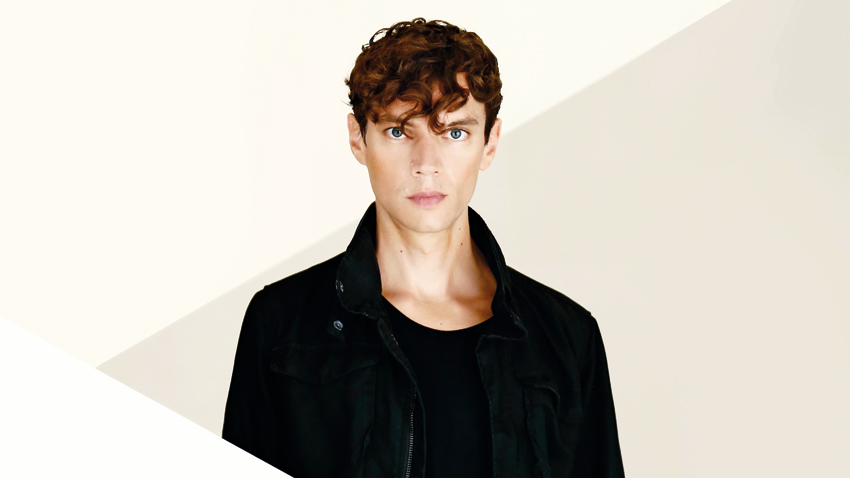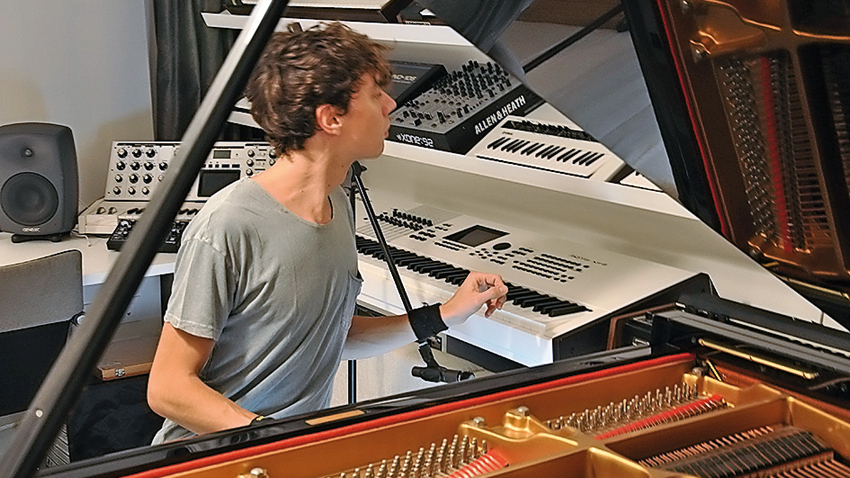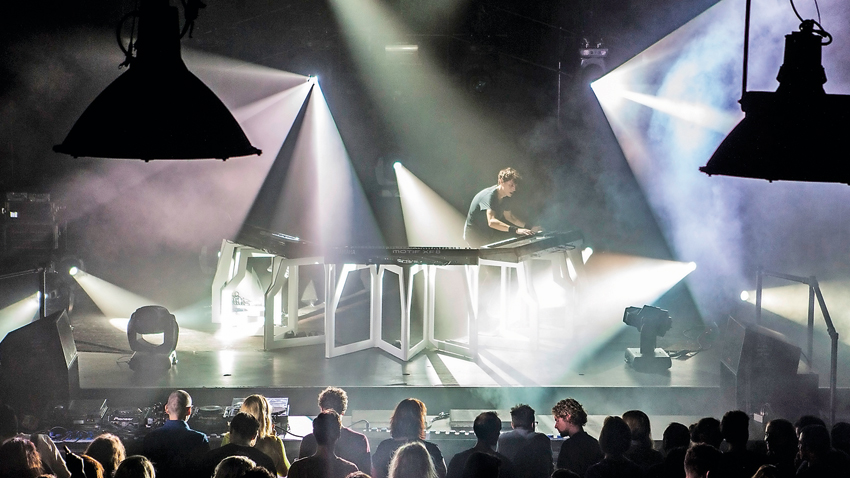Francesco Tristano on making the move from classical to electronic music
We meet the extraordinary Barcelona-based talent who coaxed Detroit techno legend Derrick May back into the studio

As a classical pianist, Francesco Tristano always felt there was a missing link between the classical and electronic realms.
While studying at Juilliard School of performing arts, he became inspired by the sound of Daft Punk’s Around The World and stepped into New York’s crazed 90s club culture. The resulting osmosis was the groundbreaking Not For Piano (2007), which saw Tristano compose piano versions of Detroit techno classics including Derrick May’s Strings Of Life. Following a chance encounter with Carl Craig at a DJ set in Detroit, Tristano was hooked up with May who later enlisted the charismatic pianist to perform classic tracks on his Orchestral tour. The duo became firm friends, as Tristano coaxed May into the studio to collaborate on his dark, minimalist Techno album, Surface Tension.
How was life growing up Luxembourg?
“I started playing the piano when I was five, and my mum pretty much listened to music from 7am to midnight every day. So my upbringing was listening to a lot of classical music, but also a decent amount of world music, '70s fusion and some electronic sounds, like Jean Michel Jarre. It all stayed with me from an early age. In fact, there are pictures of me aged seven or eight, where I put my keyboards around the piano and tried to play with one hand on the bass synthesiser and the other on the piano. That’s what I always wanted to do, combine the electronic and acoustic worlds.”
What keyboards did you have at that early age?
“They were mostly consumer keyboards. Yamaha had a great PSR series; I’m amazed they still make them. The other day I stumbled on an internet site that had old demos of all the PSRs and recognised some of them. I also had a Casio and I can’t recall the serial number but I had an Elka keyboard - an Italian brand that was big in the 70s/80s but went bankrupt. So, yeah, instruments from a range of manufacturers but my pianos were always Yamaha.”
How did your interest in classical music grow?
Get the MusicRadar Newsletter
Want all the hottest music and gear news, reviews, deals, features and more, direct to your inbox? Sign up here.
“There was a very old, chunky piano at home, so I think that was a strategic move by my mum. I’d walk by and play a few notes but the approach was very natural and instinctive. Of course, I heard a lot of classical music at home, so it was the logical step to learn, and I started playing Bach at some point. He was always my favourite composer and still is.”
How did your interest broaden from classical to electronic music?
“I would say the first thing was jazz, because jazz is an escape route from playing scores that are 100 per cent written out, and you just have to interpret the notes. Jazz gave me a lot of room for improvisation, so when I was about 11 or 12, I wanted to become a jazz pianist. But I’d always had a love for synthesizers and electronic sounds, and I think it must have been Daft Punk’s Around The World that hit me.”
Was it your first introduction to dance music?
“I didn’t really like the song so much, but was very intrigued and wanted to find out how this music was produced. I started playing it on the piano and was trying to figure out the pitches and how the track made sense. Then I moved to New York in 1997, at the time of super clubs like Twilo, and got into the club music world. I got a pair of turntables, hunted records and bought compilations. While I was studying classical piano at Juilliard School, I had access to the music lab and started using Logic there. They also had some analogue and digital synthesisers. So I would practise my piano by day, and in the evenings I would go to the music lab and try to sequence and play around on the synths.”
Did you see the possibilities that electronic music could offer as an extension of what you’d already learned as a classical pianist?
“What I loved about electronic music from the very beginning was the structure. The structure of minimalism was something that was very appealing to me, because it was the quality I was looking for in classical music, too, especially old baroque music. So it was not a departure but, as you pointed out, an extension. Minimalism has been around for centuries; Bach was one of the first minimalist composers, but I also felt that the insistence of the bass and the bass drum is a very baroque feeling. If you look at a score from Bach, you can analyse the way the music is built from the bass. It’s funny because you can say bass as in b-a-s-s or b-a-s-e.”
If you look at a score from Bach, you can analyse the way the music is built from the bass. It’s funny because you can say bass as in b-a-s-s or b-a-s-e.
People have an idea of classical music being intellectual. Do you find minimalism to be the intellectual side of electronic music?
“It probably is, but the difference between classical and electronic is not always so clear and the snobbism is equal. You have the classical listener who has a higher opinion of themselves, but that attitude is just as present in hardcore electronic guys. My vision is a bit more open. I think there is a lot of room for experimenting, especially when you start mixing acoustic and electronic elements. Some people were not supportive when I started, but I didn’t care. In the 60s, electronic music was already part of the classical music realm and a lot of people were doing it and it became institutionalised. We think electronic music is dance clubs and raves, but the core comes from heavily subsidised classical music research labs.”
Did Electronic music appeal to you because you could experiment with sound and mould it in a way you couldn’t in the classical realm?
“Oh, definitely, and that's one of the things that I’m attempting to do. For example, I have real-time processing of my piano sound and love to play recitals where I mix classical repertoires with some of my music but play the show through a PA with effects and processing. I don’t want to say that the classical establishment is on its way to fossilisation, but it has been stale for centuries and there is a risk that classical music, as we know it, is dying out. That’s why I think you've seen the rise of the new composer/performer generation, like Max Richter and Nils Frahm.”
With your piano versions of tracks by techno legends such as Jeff Mills and Derrick May, have you reconceptualised music?
“I’m not interested in what is techno or classical; what defines music for me is what instruments you use. There's a whole world in-between classical and electronic music. You can record acoustically and do post-production electronically, or put acoustics into a digital three-dimensional sound space using reverbs and delays.
“When I brought out Not For Piano in 2007, I wanted to hint at the direction of electronic music. The fact is, Bach can sound great played on synthesisers, too, so why would Carl Craig or Derrick May’s music not sound great on a piano? We’re so quick to put a label on things, and I read the craziest descriptions, but does it really matter? There are no record shops left, or very few, so we don’t even need to classify records - you can just describe the sounds you like and put a hashtag on them.”

How did the union with Derrick on new album Surface Tension come about?
“Carl Craig was the first Detroit guy I met about 12 years ago. I went to his DJ set and just walked up to him afterwards, and he was interested by the fact that a piano player was listening to his stuff. A few years later, we met up again through friends and started working on some projects, and soon enough, I went to Detroit and he introduced me to Derrick. We just went cruising in the car and I got a history and geopolitics lesson as he knows the city inside out [laughs]. I think I might have given him my version of Strings Of Life at the time.
“About three years ago, he did his orchestra project and I wasn’t a part of it but - and this is not a joke - the piano player broke his arm and Derrick asked me to jump in. We started playing on stage together, and I said I wanted to get him into the studio and do some music.”
How did that go down?
“He was like, ‘No, man, I don’t think that’s going to happen’. A lot of people have tried and no one managed it, but actually it was quite easy to lure him in, because Derrick’s a musician - he wants to play. It’s a challenge for him to play keyboards, and one he loves. I remember one evening I had a dinner party here at home and he spent an hour or two on the piano playing random stuff while everybody was chatting.”
We were expecting you to say that you went to visit Derrick and were dumbfounded by all his gear, but it was the other way around..?
“I have a real nice environment where all the synthesisers are hooked up, so he would come into the studio and try to figure out his sound and EQ it. He’d say, ‘Hey, man, don’t record me yet’, but of course everything was recorded and some of those were the best takes.
“Most of the album was recorded here, but I did go to Detroit once, and that was interesting because Derrick has different synths, like the Roland TR-909 and TR-808, and some samplers from the 80s. He also has some new digital synths, so there was another layer of sounds for me to use. The whole album is 90% hardware; I’m not really interested in soft synths. Don’t get me wrong, some of them sound great, but it’s nice to have a hands-on feeling to the sound you’re producing.”
How did you work on the tracks? Was it all done remotely or did you work together in person?
“The idea at first was to keep the sound raw and not over-process it, because the raw synthesiser sound is what makes the sound of Detroit techno. These guys didn’t know what they were doing at first – they had a multitrack recorder and would plug in an 808, maybe a Korg M1 and a little bass module and that was it – there were no plug-ins, delays or huge reverb units. So my idea was to get back to the core sound of techno using vintage and digital gear for the most evocative sounds, like the string pads. It was all composed in real time while we were together in the studio and, like I said, most of the time I was recording when Derrick didn’t know it.”
What was the platform for your ideas?
“The idea was to get a metronome going, so we had a speed to hold on to. Then maybe one of us would come up with a Moog bassline or some kind of Korg stab that I could put into the sequencer and play on top of. But we didn’t record little samples, the takes were sometimes 40 minutes long, so I had a lot of stuff to edit for the production of those tracks, maybe about 12 hours’ worth.”
The tracks you worked on sound quite filmic and atmospheric, especially The Mentor…
“For The Mentor, I had this bass loop going that I was modulating. Derrick told me to keep it going and was playing synths in the high-end that were really cinematic. I could really go in any direction with it. Without the kick drum, it could have been an ambient track or an old Detroit-based instrumental journey track.
“One important thing to mention: a law that both Derrick and Carl Craig abide by is that music comes first and the rhythm is always last. So we’d never start a session with rhythm programming. I did all the rhythm sequencing much later, once the music was in the box.”
My idea was to get back to the core sound of techno using vintage and digital gear for the most evocative sounds, like the string pads.
Could you see yourself in the soundtrack world, which often bridges electronic and classical?
“I’m very much interested. You’re right, the medium of film scoring is one that has a lot of blurred lines between genres. But it’s a closed business. Once you start writing film scores, you can write a lot of them, but you need an entrance into this world, which is something neither Derrick or I have experience of.”
So what does your studio comprise of, exactly?
“It’s a home studio in a separate room and mainly consists of synthesisers that are all hooked up, ready to play and record. For me, that’s the most important thing if I want to be creative. I work with a sound engineer because that’s something I cannot do, although I can mix, master and EQ to a certain point. I have a grand piano in the studio, too, and did record a few piano takes for the album; but most of the piano was not recorded in my room but studios in Paris and Luxembourg.”
What do you make of Yamaha’s new wave of reface synths?
“When I spent time at the music lab, there was a first generation DX7, which was really a pain to use because it’s difficult to program, but the reface DX is a beautiful version.
“It’s kind of fashionable these days to have these mini keyboards. Roland and Korg make them, so Yamaha had to sooner or later. The difference between them is that Yamaha were a piano company first, not motorbikes or golf clubs, so they always pay special attention to the action of an instrument. They’re small keys, with only three octaves, but they’re such a pleasure to play if you know how to program and get the sounds you’re looking for.”
What about modular gear?
“I am fascinated by it, but I haven’t set foot there yet, because I think that once you start there’s no going back, and buying modules is an expensive hobby. I will get into it, no doubt, because the oscillator is the essence of electronic music; but for now, I’m just concentrated on what Derrick calls ‘the boards’.”

Do you use Logic’s software libraries or other soft synths?
“I do, but my basic synth sounds are not soft synths. I’ll maybe use some compression and a little bit of reverb, but I’ll mostly use plugins for that, because I only have a few hardware effects boxes. But Arturia are good, they have a great version of the ARP 2600, and Lexicon do a great job on the reverbs. I also use some of the Waves packs.”
What can you tell us about your live setup?
“On stage, I use Ableton, as it’s the only software that’s really made for live performance. It’s very sturdy and won’t let you down. I have attempted using Logic many times on stage and it’s a mess, although it’s still my favourite sequencer to work on in the studio. I work on Pro Tools and Cubase, too, so I don’t exclusively use one software DAW, and of course the VSTs work across all platforms.”
Do you bring your hardware synths on stage?
“We’ve done three shows in the past month in Tokyo, Berlin and Amsterdam called p:anorig, where we bring the studio on stage and use six synthesisers. I tend to believe that improvised music is the highest form of music making, because it really makes you connect with the moment. You can plan as much as you want, but if you’re not in touch with the moment in which you convey the music to the audience and yourself, nothing is happening.
“I’m a live performer and always have been - I started playing piano recitals when I was six. The idea is to tour the companion show of the album in the spring.”
Surface Tension is out now via Transmat. For news, release info and dates head to Francesco's website.


Future Music is the number one magazine for today's producers. Packed with technique and technology we'll help you make great new music. All-access artist interviews, in-depth gear reviews, essential production tutorials and much more. Every marvellous monthly edition features reliable reviews of the latest and greatest hardware and software technology and techniques, unparalleled advice, in-depth interviews, sensational free samples and so much more to improve the experience and outcome of your music-making.
“I’m looking forward to breaking it in on stage”: Mustard will be headlining at Coachella tonight with a very exclusive Native Instruments Maschine MK3, and there’s custom yellow Kontrol S49 MIDI keyboard, too
MusicRadar deals of the week: Enjoy a mind-blowing $600 off a full-fat Gibson Les Paul, £500 off Kirk Hammett's Epiphone Greeny, and so much more










